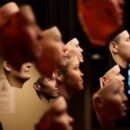Why do we neglect the real wealth in our lives?

The rat race consumes many. There is a fevered desire to have more: more money, more belongings, more status, more power. We plunge into this race without thinking, because so many around us seem to be running ahead of us. We fear getting left behind, being shunned, being disrespected. And so we run and run, all racing to be…what?
We think there are some essential truths at play. We think more money is always better than less money, so any opportunity to make more should be grabbed without hesitation. We think a bigger house is better than a small house, and owning many houses is even better. We think pricey belongings bestow prestige on their owner, so we must make every attempt to display them to others.
We are convinced: more is more.
And so we work all hours. We have many hustles. We need our money to make more money. We are constantly looking for new opportunities. We cannot rest. We are stressed by the race to have more and be more. We fear losing pace and seeing our peers race ahead.
This is because our definition of wealth is so very narrow—it is material and measurable. It focuses only on purchasing power, belongings and baubles, acres of land, net worth. Allow me to suggest today that are some forms of wealth that are sorely neglected in this inadequate assessment.
The first, essential form of wealth is the one we were told about as children, but forgot quickly: health. Without health, we have nothing. We cannot participate, we cannot run any race, we cannot contribute. Good health does, of course, depend on many variables, not all of which are in our control. Our genes play a crucial role, as does our habitat, our age, and even sheer randomness. But how many of us actually do the things that are in our control—moderation, exercise, balance—to improve our chances of having good health?
A second type of real wealth: stable, healthy relationships. Our connections to others really matter. Having people who have your back, and who in turn matter to you, is a proven way to have a more fulfilling life. This wealth comes from us—we usually get the relationships we deserve. Those who are kind often get kindness back; those who radiate outwards can find warmth and light reflecting back on them. We don’t need many such relationships in order to be rich, but we do need them to be genuine and non-transactional. We also need to extend good relationships beyond kith and kin. How many of us invest in proper relationships—with loved ones, yes, but also with friends, colleagues, companions?
A third wealth asset: independence. It is hugely empowering to be free to make one’s own decisions, to chart one’s own path, to not be beholden to others. Feeling trapped in the whims and demands of others is a source of much unhappiness. Much as we need connections, we need those connections to be free of imposition and dominance. This freedom requires a certain amount of financial wealth, yes—but it also requires the mental strength to resist the chains of others.
Lastly, there is the wealth that is a true luxury: time. Time is our scarcest asset, and the most limited. We are only given so much; and we know not how much. How do we use this gift, this boon of time on earth? Do we squander it on puerile races, petty squabbles, egotistical demands? Or do we reserve valuable time for reflection, for whimsy, for learning?
These four sources of wealth—health, relationships, independence, and time—are right there under our noses, but we are too busy racing for a different prize to even notice them. And here’s the funny thing: the race towards manic material gain actually harms these more essential stores of wealth.
Those who are trapped in the contest to have more and more often lead the least-balanced lives. Their health suffers as they eschew rest and embrace stress. They reduce their lives to a series of transactions, and so neglect the key people who might offer them succour, advice, and concern. Far from using wealth to be independent, they enter the prisons of new jailers: banks, investors, competitors, social circles. And time? That’s all swallowed up in the neurotic race to have more. All hours are devoted to accumulation.
It is foolish to focus on one kind of wealth, ephemeral and meaningless, at the expense of the things that actually make us rich—our strength and wellness, our ability to make deep connections, our freedom to be ourselves, and the luxury to have free time. I paraphrase again some of my favourite words, written by Jerome K. Jerome more than a century ago: pack lightly for the journey of life, pack only what you need; look not at what your fellow travellers have; take time to think as well as to work; take time to drink in life’s sunshine.

Buy Sunny Bindra's new book
The X in CX
here »
Popular Posts
- You are who you hang out withSeptember 28, 2025
- Born knowing the waySeptember 21, 2025
- The cost of pretenceSeptember 7, 2025
- The art of the CX rescueSeptember 14, 2025
- The balance sheet that mattersOctober 5, 2025















